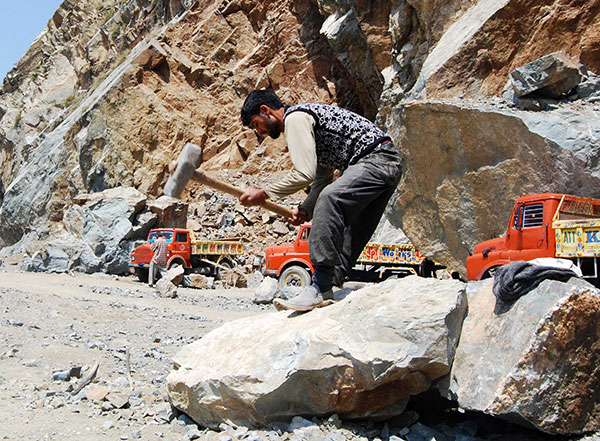Srinagar, Jan 22: Hundreds of stone quarry owners and workers from Pantha Chowk, Athwajan, and Zewan areas in Srinagar are grappling with severe hardships due to the ongoing ban on quarry mining, which has been in place for over four years.
With their livelihoods crushed by the prolonged ban, they are now appealing to Lieutenant Governor Manoj Sinha and Chief Minister Omar Abdullah to grant them a short-term permit for three years or provide rehabilitation options.
Muhammad Maqbool Para, president of the Himalayan Quarry Association, describes the last four years as an uphill battle. “We’ve been knocking on every door, but nothing has changed. Our children are suffering—how do we feed them? This isn’t just about livelihoods; it’s generations of hard work and tradition being erased,” he said, his voice thick with emotion. Para highlighted that nearly 350 to 400 quarries in the Athwajan, Pantha Chowk, and Zewan areas once supported the livelihoods of over 100,000 people, both directly and indirectly.
For families like that of Abdul Hameed Bhat, president of the Kohinoor Stone Quarry Association in Zewan, the impact is deeply personal. Bhat’s family has been in the quarry business for three generations. “This work is in our blood,” he said. “My grandfather and father fed their families through quarrying. Now, I am forced to watch my children go hungry. Many of our workers, drivers, and JCB operators have switched jobs just to survive. This is not just about losing jobs—it’s about losing hope.”
The ban, imposed in 2021, was reportedly driven by concerns over environmental degradation and the lack of necessary clearances from the Wildlife and Forest Departments. However, quarry owners feel ensnared in bureaucratic hurdles. “We’ve been asked to obtain clearances, but the process has been impossible. These clearances have become excuses to prolong our suffering. We’re willing to comply with regulations, but we need the government to meet us halfway,” Para said.
Beyond financial devastation, the ban has had widespread social consequences. Families are unable to afford basic necessities, leading to children dropping out of school and unmet medical needs. “Every night, I hear my wife cry, worried about how we’ll manage another day,” said one JCB operator who recently switched to menial labour in Srinagar. “It feels like we’re invisible—no one cares.”
The stone quarry industry, once vital in supplying raw materials for construction and infrastructure projects across Jammu and Kashmir, has been brought to a standstill. Affected families are now pleading with the government to find a solution.
“We are not asking for charity,” Para emphasized. “We just want a chance to work and provide for our families. Either grant us a short-term permit for three years to help us get back on our feet or rehabilitate us properly if operations can’t resume. We cannot survive like this any longer.”
With an elected government now in place, quarry owners and workers hope their voices will finally be heard. “It’s a matter of life and death for us,” Bhat concluded. “We’re not just quarry owners—we’re fathers, mothers, sons, and daughters trying to live with dignity. The government must find a middle ground before it’s too late.”
Srinagar’s quarry workers struggle to survive as mining ban continues
Appeal LG & CM to lift mining ban or provide rehabilitation

Leave a Comment Leave a Comment







